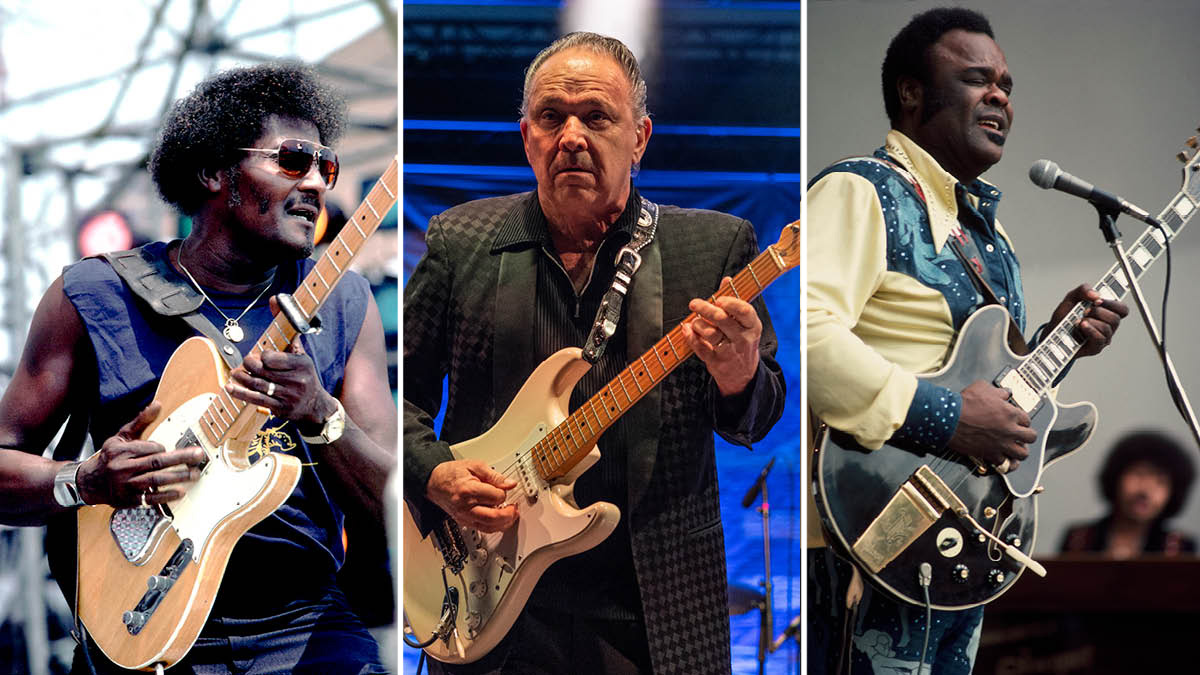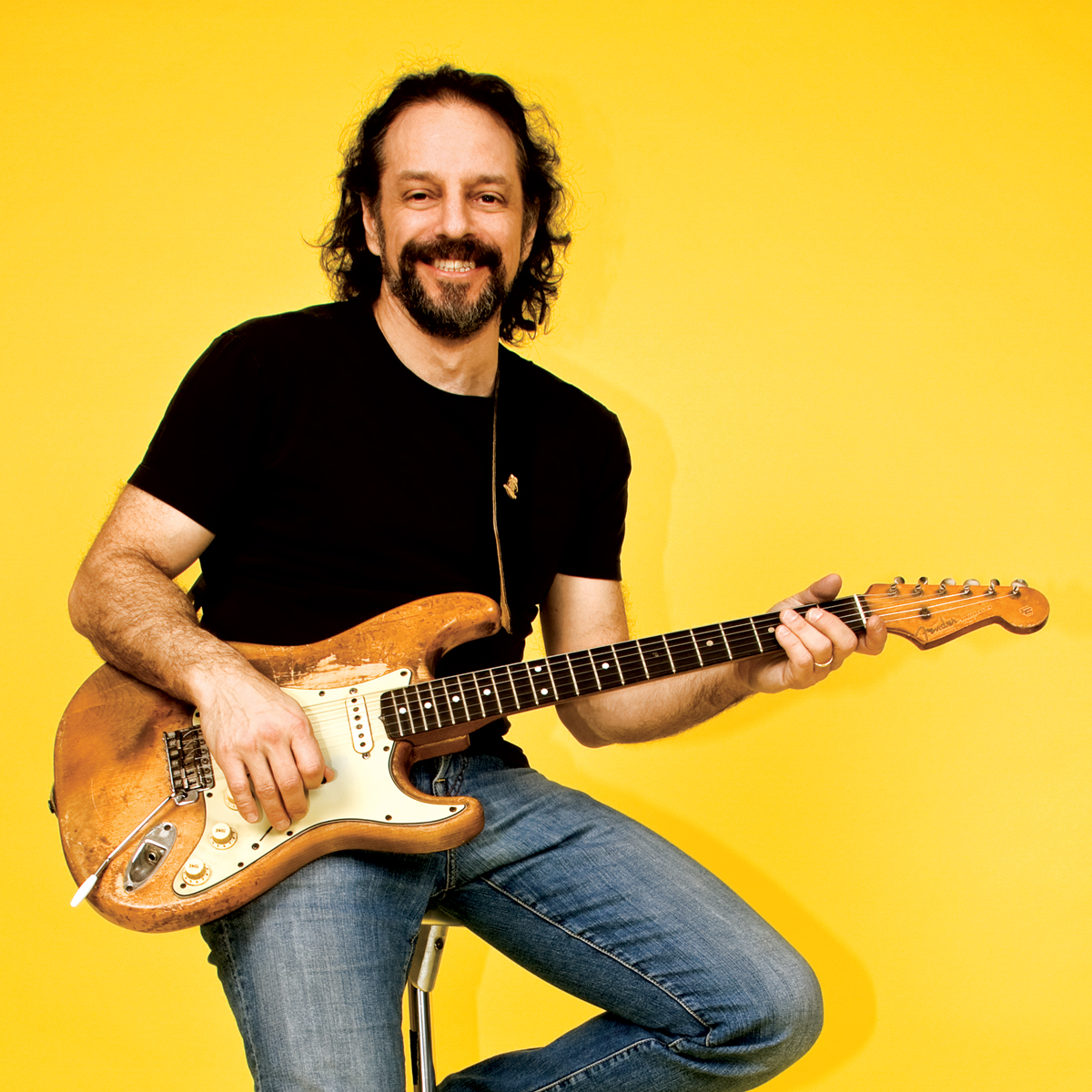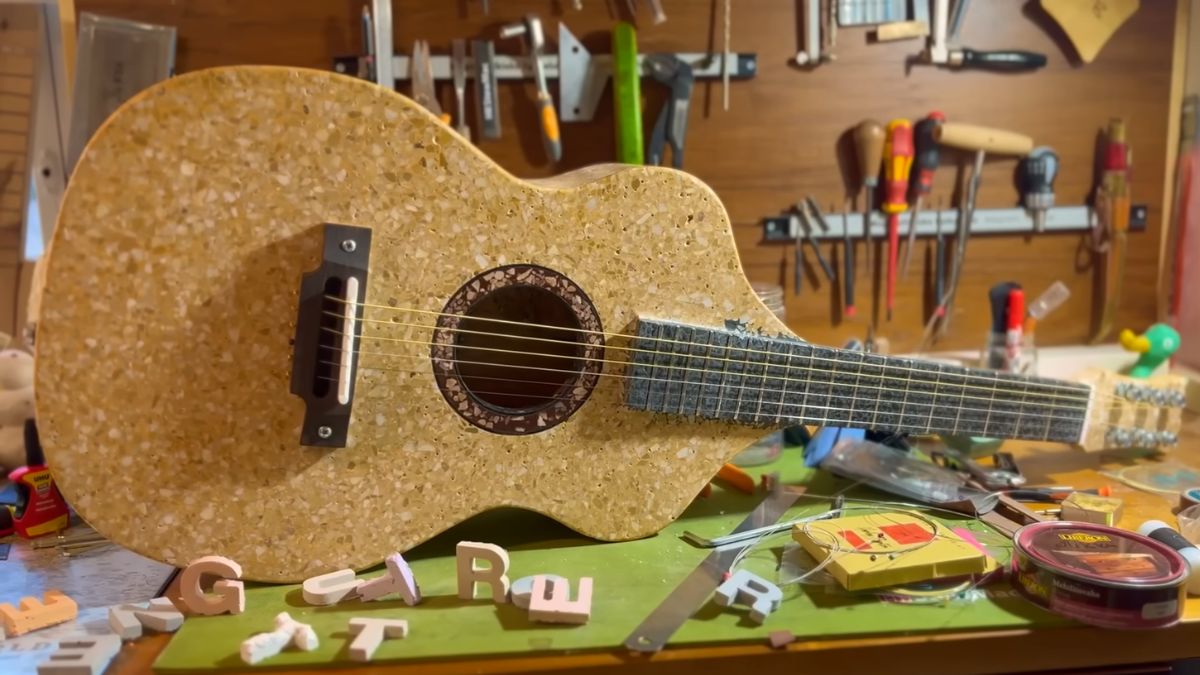Jimmie Vaughan names his 12 favorite Texas blues guitarists
“This is a serious list,” says Vaughan, and that is no word of a lie...

Jimmie Vaughan is the sound of Texas blues guitar. Long before he burst onto the national and international scene with the Fabulous Thunderbirds in the early ’80s, Jimmie was playing juke joints, bars and clubs all over Texas from the age of 15, sharing stages and playing with Muddy Waters, Freddie King, Jimi Hendrix and many others.
No guitarist is better equipped to lay down the law on the most essential Texas blues guitarists in history, and below, he picks out 12 of the greatest, most legendary players that originate from the Lone Star State.
In Jimmie’s words, “This is a serious list.”
1. Oscar Moore
Oscar Moore (1915-1981) is well known as the effortlessly swinging guitarist in the Nat King Cole Trio, with whom he recorded for a decade, from 1937 to 1947, cutting classic solos for the essential Cole tracks Gee Baby, Ain’t I Good to You, Moonlight in Vermont, Sweet Lorraine and many others.
“Oscar was originally from Austin,” Jimmie says. “He moved to L.A. to find his fame, as did many other guitarists, like T-Bone Walker. To me, the quintessential Oscar Moore track is, Nature Boy, live with Nat King Cole. Top that! He’s incredible. He was a great jazz guitar player and a great blues guitar player.”
2. T-Bone Walker
“T-Bone was the first guy cutting electric blues solos on the guitar, going back to the very early ’40s. And you can listen to his records all the way from then till the end of his career in the ’70s, and he always pretty much played the same, with the same tone and the same level of virtuosity.
“He had his own tone, and was picking out single-note solos, bending strings and all that, like no one ever had before. He had that descending ninth chord thing that he did as an intro on so many tunes, and I’ve never heard anyone else do that.
Get The Pick Newsletter
All the latest guitar news, interviews, lessons, reviews, deals and more, direct to your inbox!
“I’d heard that T-Bone and Charlie Christian, who were friends, worked the street together back in their hometown in Oklahoma.” [Note: Christian was born in Bonham, Texas, but moved to Oklahoma when he was very young.]
3. Clarence 'Gatemouth' Brown
“There is no denying that, real early on, Gatemouth was blazing some new trails. I heard that when T-Bone started getting more hit records and would go out on the road, one of the people that replaced him in his residency in L.A. was Gatemouth. That was way back there in the early ’40s. He had the capo and did everything with fingerpicking, like, Okie Dokie Stomp. Just great guitar playing.”
4. Albert Collins
“Albert had a completely original style. His F minor tuning [F C F Ab C F] , combined with the clamp [capo] helped him get that original sound. Everybody saw Gatemouth with the clamp, and Guitar Slim over there in Louisiana and Albert were disciples of Gatemouth.
“I don’t know where he got the tuning, but it could have been a hand-me-down thing, as it often is. John Lee Hooker tuned to open G, which is called ‘Sebastopol’ or ‘Spanish tuning,’ and he got some very distinctive sounds and chords out of that tuning.”
5. Pee Wee Crayton
Though certainly not as well known as the legendary blues guitarists B.B. King and T-Bone Walker, Pee Wee Crayton (1914-1985) is a giant of blues guitar that, in his day, was a star. His song Blues After Hours reached Number 1 on the Billboard R&B chart in 1948.
“Pee Wee’s got to be in there with Albert Collins and Gatemouth,” Jimmie states. “Blues After Hours, Texas Hop and many more. Pee Wee was another incredible player. I got turned on to him and loved him immediately, and he became an influence. But if we were around back in 1948, we would have been well aware of him. He’s from the Round Rock/Rockdale area, which is right near Austin. He’s another guy that went out to California to make it big.
“I have the 78 of Pee Wee doing Country Boy, the same song that was cut by Dave Bartholomew [Bartholomew co-wrote many of Fats Domino’s biggest hits, such as Ain’t That a Shame, Blue Monday and I Hear You Knockin’], and Pee Wee’s version is so great. It’s a fabulous record with a great guitar solo.”
6. Lightnin’ Hopkins
“I love Lightnin’ Hopkins – he was just fantastic! I got to know Lightnin’ a little bit, from the shows he came to play in Dallas and Austin. He was mesmerizing to watch. I saw him play on Valentine’s Day, just him by himself, at this club in Austin one night, and he changed up all of the songs.
“He said, 'It’s Valentine’s Day, so this whole night, it’s all for the women,' and he changed the lyrics and made them up as he went along. All his songs would be good for Valentine’s Day, really, if you think about it. But he’d put a woman’s name in there and switch it up for the occasion.
“There are songs that are known as being associated with other artists that very well may have originated with Lightnin’, but if he did someone else’s song, he owned it – he made it his. He would talk about another Texas guitar player that he learned a lot from – Texas Alexander.”
7. Hop Wilson
“I have to include Hop Wilson, even though he played steel guitar,” Jimmie says. Harding “Hop” Wilson (1921-1975) was born in Grapeland, Texas, and was nicknamed “Hop” as a devolution of the word, “harp,” for harmonica, which was his first instrument. He moved over to the steel guitar as an early teen and began recording for Goldband Records in 1957.
“Chicken Stuff, Black Cat Bone, I Done Got Over, I’m a Stranger – all great tunes. Chicken Stuff – is that wild, or what? When you think about the records people make now, not to be mean, but there’s no comparison now to records like those for feel, attitude, sound, everything. Like anything, I guess you have to have a taste for it, but I do. I mean, how can you not like that if you like blues?”
8. Lil’ Son Jackson
Melvin “Lil’ Son” Jackson (1915-1976) is from Tyler, Texas, and was signed to Gold Star Records, releasing Freedom Train Blues in 1948. It became a hit nationwide.
“What a pioneer Lil’ Son Jackson was,” Jimmie says. “He wrote Rock Me Baby, except he called it Rockin’ and Rollin, released back in 1950. It’s basically the same lyrics as B.B. King’s Rock Me Baby [released by B.B. in 1964]. And also, Slim Harpo took the same basic guitar riff from Rockin’ and Rollin’ and turned it into, I’m a King Bee [released in 1957]. He played in Sebastopol tuning and in standard tuning, using the capo sometimes, too.”
9. David Schwartz of the Nightcaps
Though virtually unknown nationally, Dallas’ own Nightcaps became one of the most popular bands in Texas following the 1958 release of their first single, Wine, Wine, Wine, backed with Nightcap Rock, the latter of which was based on the hit song, Night Train.
The band consisted of four high school students, lead by vocalist/songwriter Billy Joe Shine and powered by the explosive lead guitar playing of David Schwartz (sometimes spelled Swartz). They released their second single, the hugely popular, Thunderbird, in 1961. Legendary Texas blues/rockers ZZ Top recorded Thunderbird as the opening track for their Fandango! album, and Stevie Ray Vaughan recorded his cover version of Thunderbird early in his career.
“The Nightcaps had some really great songs, like Wine, Wine, Wine and Thunderbird, which Stevie and I grew up listening to and eventually learned to play,” Jimmie says. “The very first album I ever bought was Wine, Wine, Wine! David Schwartz was the lead guitar player, and right after I got that album, I tried my best to copy his leads, and I learned all the rhythm parts too, as well as the bass parts, and I even tried to play the drum parts too! So it’s safe to say I really loved that record!”
10. Freddie King
“I could talk about Freddie King for hours,” Jimmie says. “Freddie learned a lot about guitar playing from Eddie Taylor, who played so brilliantly with Jimmy Reed and John Lee Hooker, and from the great Jimmy Rogers. You can tell, when he plays some of the instrumentals and some of the stuff he recorded backing up Smokey Smothers, he’s basically taking the ‘Eddie Taylor’ role.
“Also, Jimmy Rogers and Eddie Taylor used thumb picks and fingerpicks, which Freddie picked up on. Then B.B. King came along, and everybody tried to play like B.B., and Freddie used elements of all of this stuff in developing his own signature sound and style. That’s what was so great about Freddie – he was like a walking blues encyclopedia.
“When I was a kid, about 12 or 13, I had his Bonanza of Instrumentals album. There were three songs in Dallas that you had to know how to play regardless if you were in a country band or a rock ’n’ roll band – Hold It and Honky Tonk by Bill Doggett, and Freddie King’s Hide Away. The thing in Dallas was, everyone kind of had their own version, their own take, on those songs.”
Freddie moved back to Texas from Chicago in 1963, and in the latter half of the decade, Jimmie met his hero.
“I played a place called the Three Thieves on Lover’s Lane, and someone told me that he’d moved back to town and lived a couple of streets over, behind the club,” Jimmie says. “One night, I was playing at a place nearby called Mother Blues, and he came in and sat at the bar, pretty much right in front of us, and watched us play. Sometimes he would sit in with us, play a couple songs and floor everybody, and then go back to the bar!”
“He used to call me ‘Ron,’ and one night he said, ‘Come with me!,’ and I got in his Cadillac with him and we drove around to his house. He went into his house, and I don’t know what he did, because I just stayed in the car! And then we went back to the club.”
11. Johnny “Guitar” Watson
“Johnny ‘Guitar’ Watson was fabulous – fantastic!” Jimmie says. “He was as good as anybody. He also played piano and sax and was an incredible singer and writer. He played sax in high school. Never met him, and, sadly, never saw him play live. Later on, in the ’70s, he came back with all those big hits, like Real Mother for Ya, which was real cool. He died onstage – top that. Lonely, Lonely Nights was great too, but that was originally Earl King’s tune.
“His first single, Motor Head Baby, from 1953, is killer – he played piano on that, too. And Space Guitar is probably the wildest guitar song ever recorded! To think that was 1954 – that was like Jimi Hendrix, over a decade earlier. Three Hours Past Midnight, Cuttin’ In, all really great records. It’s still exciting to hear that stuff.”
12. Mance Lipscomb
Mance Lipscomb (1895-1976) was born Beau De Glen Lipscomb near Navasota, Texas, between Austin and Houston. As a young man, he took on the name Mance as an abbreviation for “emancipation.”
Following his discovery in 1960 by Mack McCormick and Chris Strachwitz of Arhoolie Records, Lipscomb became an important artist in the folk revival of the early ’60s and was a regular performer at folk festivals and folk-blues clubs around the U.S., most notably the Ash Grove in L.A.
“In the early ’60s, Mance Lipscomb records were released on the Arhoolie label, which is how I discovered him. Mance did some great covers, like Baby Please Don’t Go and Jimmy Reed’s Big Boss Man. When I first came down to Austin in 1969, Mance would play the Armadillo and places like that, and I got to see him a few times. Great acoustic fingerpicker and singer.”
Guitar World Associate Editor Andy Aledort is recognized worldwide for his vast contributions to guitar instruction, via his many best-selling instructional DVDs, transcription books and online lessons. Andy is a regular contributor to Guitar World and Truefire, and has toured with Dickey Betts of the Allman Brothers, as well as participating in several Jimi Hendrix Tribute Tours.
“There’d been three-minute solos, which were just ridiculous – and knackering to play live!” Stoner-doom merchants Sergeant Thunderhoof may have toned down the self-indulgence, but their 10-minute epics still get medieval on your eardrums
“There’s a slight latency in there. You can’t be super-accurate”: Yngwie Malmsteen names the guitar picks that don’t work for shred





![A black-and-white action shot of Sergeant Thunderhoof perform live: [from left] Mark Sayer, Dan Flitcroft, Jim Camp and Josh Gallop](https://cdn.mos.cms.futurecdn.net/am3UhJbsxAE239XRRZ8zC8.jpg)









